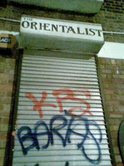The first glimpse of history I catch every morning as I gaze upon the charcoal stained precipice of my neighbour’s terrace is the London of Queen Victoria, her roof choking on the fumes of industry and the interminable toil of her working masses. In the evening the shrieks and gasps of the revellers below are reminiscent of the libertinism unleashed by the restoration of Charles II to the throne, libidinous crowds ringing the death knell of heady political conflict with effusive pelvic thrusts. The past then not so much lulls me to sleep but rather pummels me into submission with fulsome images of utilitarian chimera. From these nights of deferred pleasures, I am often precipitously thrown out of sleep by the incessant hammering of the future, the pretense of renewal compounding the weariness that history has worn on my face. I too engage in this guise, running hot water over my eyes, vainly rejecting the faint traces of the past around me in favour of my own trailblazing agency. The trail I blaze to the office is an instant reminder of this farce as I am quickly thrust into a present more medieval than modern. The vast effluvium of words carelessly spat out of the collective mouth of the media behemoth, value free fact mediums to some, augur ultimate calamity, tossing me drunkenly into an absurd narrative where the past coalesces in an ungainly mixed metaphor.
Here amongst the perpetual blaze I can no more be Samuel Pepys than I can Prometheus, my cognizance and my will inhibited by the charcoal filtered opinions of the experts. It would seem that the spirits forced upon my liver would provide powerful distraction from the sky’s collapse, though I rarely find solace, for the drink I have imbibed leaves me with the impression that I am in total control of my body.
And so I find myself not on the streets of present day London but holed up in a vestibule in the city of Oran, my eyes dried by the smoke, fearing that the plague-ridden rats will finally breach my barricade. In the East, I hear that all of course is not well with Innocent III’s latest battle with the heretics of Islam. In the Caribbean and the Far East I hear of islands where the last beacon of upright certitude, the public sphere, has been swallowed up by profligate autocrats, binding the natural right of speech in the most ingenious of artifices. Convoluted I’ll admit but denying access to toothpaste restricts the mouth from protesting too loudly for fear that the noxious odours buried within will offend the senses of passersby. It is said too that citizens there have no right to float on the benevolent waves of the internet and therefore no access to the vast amounts of unbridled fact buoyed on the crests of freedom. This idea is too much for my fear-stricken body to handle, shudders sent down my spine by the thought of never knowing the manatee of free speech.
In the West, Cotton Mather does battle with heresies of his own, these of course are merely spectres, omens of future incarnations of socialist science proffered by Godless communitarians fit only for the guillotine or the madhouse. His opponent plays a similar deadly game calling for change and offering the morality of security and Keynes as bulwarks against the crises of ideology. And here the last shred of comfort warms my limbs, the absurdity of optimism while entrenched in the wasteland of the Somme momentarily betraying me. There still exists a space free from the extremes of belief and ideology, a place of solid objectivity unchallenged by the tyrants of postmodernity, an area peopled by the most virtuous of modernity, their virtue marked by the absence of subjective value. It is the public realm, and they are the upright citizens possessed of good jobs.
I can imagine this idyll from my perch in Oran, the good faces of the good people with good jobs unblemished by the agglomeration of history advancing around them. I pass my lustful gaze upon the recent past and the deference evoked by every instance they crossed my path. I, like everyone else, am enamoured by their devotion to their daily tasks, at how they fulfil their Aristotelian functionality with steadfast certitude while the outside realm is afflicted by the effects of causes, thrown into chaos by greed and power. Outside this sphere, amid such utter depravity, Flannery O’Connor is correct, a good man is hard to find. But within, good people abound, a conglomeration of organs working together to ensure the survival of the last great social organism. It pains me to dwell on this distant idyll anymore as I turn my gaze upon the dead society around me, a world turned upside down by so many beasts of no nation, ill gotten without merit or hard work. At twilight, the poverty in the air is rife as I learn of the collapse of so many more seemingly stable markets. I scoff at the insinuation that some of our current problems are a direct result of the economic sphere, as if good people could be the root of such destruction.
I fear my demise is close at hand as my mind passes through that euphoric state the unwitting wildebeest drifts into just before the lion’s jaw closes upon its beleaguered body. There I return to a lush state of nature. From my solitude in the medieval present, I am now immersed in the companionship that only the timeless age of labour can offer. I am approached by one particularly estimable person whose hello I return in the affirmative.
“And what do you do?” he asks curiously.
Pride swells within as I taste for the first time the sense of belonging. But before I can respond, the distant scuttle of rats becomes omnipresent throwing me once more from dream to nightmare.
Start to the year! 365 days of green!
11 years ago


